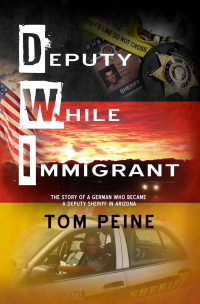Tom Peine Interview Published on: 16, May 2024
 What inspired you to make the dramatic career shift from finance to law enforcement in a different country?
What inspired you to make the dramatic career shift from finance to law enforcement in a different country?
The career shift was actually from software sales and freelance consulting work. As I explain in the book, it was by chance that I came across the announcement of a hiring process from the Pima County Sheriff's Department. I also had a job offer from Wells Fargo, which would have brought me back into finance. All that said, and explored in the book, seeing the ad rekindled a calling I had earlier in life, during my teenage years.
How did your background in banking in Germany prepare you for the challenges of law enforcement in the United States?Rather than just my time in banking, which was only four years at the very beginning of my professional career, it was the 20 years of sales and customer care experience that taught me how to listen, how to communicate effectively, and how to relate to and read people in various situations that significantly eased my transition.
Can you share a specific incident or experience that stands out from your time as a Deputy Sheriff in Pima County, AZ?This is a ubiquitous question I get. I find it impossible to single out a specific incident as "significant" because first, we would have to agree on what makes an incident significant. Most calls I responded to or cases I investigated were significant to those involved, for both victim and perpetrator. I would not wish to single out one over another. If significant means spectacular or exciting, then I believe it would be an improper reduction of what the profession of public safety officer truly entails. While there is a small number of cases I vividly remember, for various reasons, I choose not to make them public out of respect. Furthermore, I am not sure where the value lies in sharing particularly tragic or gruesome cases, as those are the ones that have the greatest tendency to linger. All that said, the book offers a great variety of scenarios, calls, and encounters I experienced, tragic and comical.
As an immigrant, what were the most significant cultural adjustments you had to make when transitioning to law enforcement in the United States?The fact anyone I would interact with could potentially have a firearm on their person, which means anyone could potentially be a lethal threat to me. It can complicate human-to-human interaction when the looming threat of a fight for life overshadows every exchange. I also feel that there is a greater cultural diversity in the U.S. compared to Germany, where, despite large numbers of immigrants, society tends to be more homogenous, at least while I lived there. Cultural diversity adds a layer of complexity and demands a high level of flexibility when it comes to communication and evaluation of specific scenarios.
Being an official spokesperson for the department is a unique role. How did you handle the responsibility of representing law enforcement to the public and the media?In the same way, I approach all my duties with an interest in the other person's perspective and needs, a certain level of compassion, and a focus on the task at hand, which is to inform the community in which I live and operate. It is a big responsibility because spoken or written words have power and create a particular perception of events described by the spokesperson. Maintaining constant awareness of that fact can be a stressful and draining experience.
What motivated you to document your experiences in a memoir, and why did you choose the title "Deputy While Immigrant"?It was the encouragement from friends and family to write down some of the situations I experienced. I saw an opportunity to make my perspective accessible to an interested reader. The title came from the peculiar similarity to the widely known acronym "DWI," which typically stands for "Driving While Intoxicated." I played around with several different ideas for a title. Still, this one felt the most fitting as it describes the essence of my experience and also closely relates to a typical aspect of the job.
In your memoir, you mention serving as a strategic outreach specialist for the U.S. Army’s 7th Army Training Command in Germany. How did this role contribute to your overall journey, and what did you find most rewarding about it?That is not something I mention in the book. It is part of my biography and happened three years after serving as a peace officer. The assignment provided a broad opportunity to bridge cultural differences, trying to create a better understanding of each other's perspective, and help connect those who serve overseas on behalf of our nation with those who are hosts to our military and civilian staff.
How has your perspective on American police culture evolved throughout your time in law enforcement, and how do you hope your memoir will contribute to the broader conversation?As one would expect, the actual experience differs significantly from what most people likely imagine. Experiencing human conflict, violence, various emergencies, and the life-altering effects of them up close and personal is a challenge for anyone. If my memoir provides an insight into that aspect of the profession and an appreciation for the fact that matters are not always as black and white as we think they are, I would consider that to contribute to the conversation. Most of what we experience in our lives are shades of grey, not just black or white.
Moving back and forth between the United States, Germany, and Oregon must have been challenging. How did these transitions impact your personal and professional life?I never experienced it as challenging, but I felt reassured that choosing to become an American citizen and place the center of my life here in the United States was the right decision for me. Today, I see my ability to appreciate and understand both sides of this transatlantic connection more as a reward and enrichment of my life.
Were there any moments during your law enforcement career that made you question your decision to switch careers, especially given your unique background?Simple answer: No.
Your memoir promises an unfiltered look at American police culture. What aspects of the culture do you believe are most misunderstood or misrepresented in the public eye?What outsiders (non-law enforcement) see as excitement, an opportunity to "put away bad guys," or bring about law and order, is really more an intricate and complex dealing with choices of other community members that harmed the vulnerable and often (not always) broke a law. Administering the consequences of those choices is arduous work and calls for a broad skill set and a sense of care for those who have been abused, disadvantaged, or disrespected.
How did your identity as a European immigrant shape your interactions within the law enforcement community and the communities you served?That is a difficult question to answer as it would require answers from both sides: Those who interacted with me in my capacity as a peace officer and my perspective. From my end, I can say that I tried to be as open-minded as possible, which was often difficult, at times exceptionally so, when dealing with the various scenarios I had to address. I want to think that I brought a different approach to the table simply because my social imprint and my experience as an immigrant made me more sensitive and receptive to other perspectives.
In the book, you discuss your time as a detective. Can you share a particularly challenging case or investigation that left a lasting impact on you?My time as a detective in the Sex Crimes Unit investigating cases of child abuse and child sexual abuse were the most difficult cases I had to address. While I felt an overwhelming sense of purpose and fulfillment in that assignment, it also left its mark. I felt most challenged describing that part of my career as the interactions with victims and suspects are intensely personal and close. Out of a sense of protection, I only described a few cases and kept it reasonably general. I am not sure I would ever feel comfortable talking about the details of those cases, including my time investigating fraud and financial crime.
Returning to the United States in 2020 must have been a unique experience given the global events of that year. How did this impact your reintegration into American society?Upon my return and arrival in Texas, the most significant difficulty was the seeming indifference of some people to the suffering of others. The division over the scientific consensus at the time to take a few simple precautions was incomprehensible to me. In my eyes, it was astounding and, to a good degree, disappointing to see how the request to take precautions for the protection of the community as a whole was misinterpreted by some as an undue interference with their freedom. While it certainly did interfere with personal choices, it did not appear unreasonable to me. My mother was in a care facility in Germany due to a medical condition that rendered her unable to care for herself; it was heartbreaking to see the toll the disease was taking on staff and patients alike, physically and mentally. Especially the initial death toll in nearby Italy and later Germany was shocking and difficult to process. Coming home to see people spread scientifically and factually ridiculous misinformation and theories, aggravated by a distrust in public information, was distressing.
How did you first learn about AllAuthor? In what ways has this website helped you as a writer? Is there anything you're not a big fan of?I became aware of AllAuthor through a recommendation and link on the Alliance of Independent Authors (ALLi) website. It is difficult for me to measure the impact precisely. I enjoy and appreciate the different mockup pictures, as I can use them elsewhere. Exposure for independent authors is everything, and AllAuthor offers some of that for a reasonable price.
Share Tom Peine's interview
Tom Peine, a German-born author, has navigated a remarkable journey across continents and careers. His life is a testament to transformation. Returning to the U.S. in 2020, Tom now encapsulates his extraordinary journey in his memoir, "DWI - Deputy While Immigrant," offering readers a candid glimpse into American police culture through the lens of a European immigrant.
 Deputy While Immigrant: The Story of a German Who Became a Deputy Sheriff in Arizona
Genre: Biographies & Memoirs
Deputy While Immigrant: The Story of a German Who Became a Deputy Sheriff in Arizona
Genre: Biographies & Memoirs

